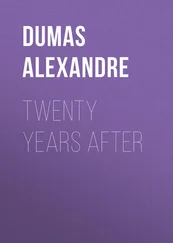"Pooh!" said the Swiss, who had needed a little time to take in D’Artagnan’s proposal, "pooh! who are you, in the first place, to ask me to take a turn with you?"
"I am lieutenant in his majesty’s musketeers," said D’Artagnan, "and consequently your superior in everything; only, as the question now is not of rank, but of quarters—you know the custom—come and seek for yours; the first to return will recover his chamber."
D’Artagnan led away the Swiss in spite of lamentations on the part of the hostess, who in reality found her heart inclining toward her former lover, though she would not have been sorry to give a lesson to that haughty musketeer who had affronted her by the refusal of her hand.
It was night when the two adversaries reached the field of battle. D’Artagnan politely begged the Swiss to yield to him the disputed chamber; the Swiss refused by shaking his head, and drew his sword.
"Then you will lie here," said D’Artagnan. "It is a wretched bed, but that is not my fault, and it is you who have chosen it." With these words he drew in his turn and crossed swords with his adversary.
He had to contend against a strong wrist, but his agility was superior to all force. The Swiss received two wounds and was not aware of it, by reason of the cold; but suddenly feebleness, occasioned by loss of blood, obliged him to sit down.
"There!" said D’Artagnan, "what did I tell you? Fortunately, you won’t be laid up more than a fortnight. Remain here and I will send you your clothes by the boy. Good–by! Oh, by the way, you’d better take lodging in the Rue Montorgueil at the Chat Qui Pelote. You will be well fed there, if the hostess remains the same. Adieu."
Thereupon he returned in a lively mood to his room and sent to the Swiss the things that belonged to him. The boy found him sitting where D’Artagnan had left him, still overwhelmed by the coolness of his adversary.
The boy, the hostess, and all the house had the same regard for D’Artagnan that one would have for Hercules should he return to earth to repeat his twelve labors.
But when he was alone with the hostess he said: "Now, pretty Madeleine, you know the difference between a Swiss and a gentleman. As for you, you have acted like a barmaid. So much the worse for you, for by such conduct you have lost my esteem and my patronage. I have driven away the Swiss to humiliate you, but I shall lodge here no longer. I will not sleep where I must scorn. Ho, there, boy! Have my valise carried to the Muid d’Amour, Rue des Bourdonnais. Adieu, madame."
In saying these words D’Artagnan appeared at the same time majestic and grieved. The hostess threw herself at his feet, asked his pardon and held him back with a sweet violence. What more need be said? The spit turned, the stove roared, the pretty Madeleine wept; D’Artagnan felt himself invaded by hunger, cold and love. He pardoned, and having pardoned he remained.
And this explains how D’Artagnan had quarters in the Rue Tiquetonne, at the Hotel de la Chevrette.
D’Artagnan then returned home in thoughtful mood, finding a somewhat lively pleasure in carrying Mazarin’s bag of money and thinking of that fine diamond which he had once called his own and which he had seen on the minister’s finger that night.
"Should that diamond ever fall into my hands again," he reflected, "I would turn it at once into money; I would buy with the proceeds certain lands around my father’s chateau, which is a pretty place, well enough, but with no land to it at all, except a garden about the size of the Cemetery des Innocents; and I should wait in all my glory till some rich heiress, attracted by my good looks, rode along to marry me. Then I should like to have three sons; I should make the first a nobleman, like Athos; the second a good soldier, like Porthos; the third an excellent abbe, like Aramis. Faith! that would be a far better life than I lead now; but Monsieur Mazarin is a mean wretch, who won’t dispossess himself of his diamond in my favor."
On entering the Rue Tiquetonne he heard a tremendous noise and found a dense crowd near the house.
"Oho!" said he, "is the hotel on fire?" On approaching the hotel of the Roe he found, however, that it was in front of the next house the mob was collected. The people were shouting and running about with torches. By the light of one of these torches D’Artagnan perceived men in uniform.
He asked what was going on.
He was told that twenty citizens, headed by one man, had attacked a carriage which was escorted by a troop of the cardinal’s bodyguard; but a reinforcement having come up, the assailants had been put to flight and the leader had taken refuge in the hotel next to his lodgings; the house was now being searched.
In his youth D’Artagnan had often headed the bourgeoisie against the military, but he was cured of all those hot–headed propensities; besides, he had the cardinal’s hundred pistoles in his pocket, so he went into the hotel without a word. There he found Madeleine alarmed for his safety and anxious to tell him all the events of the evening, but he cut her short by ordering her to put his supper in his room and give him with it a bottle of good Burgundy.
He took his key and candle and went upstairs to his bedroom. He had been contented, for the convenience of the house, to lodge in the fourth story; and truth obliges us even to confess that his chamber was just above the gutter and below the roof. His first care on entering it was to lock up in an old bureau with a new lock his bag of money, and then as soon as supper was ready he sent away the waiter who brought it up and sat down to table.
Not to reflect on what had passed, as one might fancy. No, D’Artagnan considered that things are never well done when they are not reserved to their proper time. He was hungry; he supped, he went to bed. Neither was he one of those who think that the necessary silence of the night brings counsel with it. In the night he slept, but in the morning, refreshed and calm, he was inspired with his clearest views of everything. It was long since he had any reason for his morning’s inspiration, but he always slept all night long. At daybreak he awoke and took a turn around his room.
"In ’43," he said, "just before the death of the late cardinal, I received a letter from Athos. Where was I then? Let me see. Oh! at the siege of Besancon I was in the trenches. He told me—let me think—what was it? That he was living on a small estate—but where? I was just reading the name of the place when the wind blew my letter away, I suppose to the Spaniards; there’s no use in thinking any more about Athos. Let me see: with regard to Porthos, I received a letter from him, too. He invited me to a hunting party on his property in the month of September, 1646. Unluckily, as I was then in Bearn, on account of my father’s death, the letter followed me there. I had left Bearn when it arrived and I never received it until the month of April, 1647; and as the invitation was for September, 1646, I couldn’t accept it. Let me look for this letter; it must be with my title deeds."
D’Artagnan opened an old casket which stood in a corner of the room, and which was full of parchments referring to an estate during a period of two hundred years lost to his family. He uttered an exclamation of delight, for the large handwriting of Porthos was discernible, and underneath some lines traced by his worthy spouse.
D’Artagnan eagerly searched for the heading of this letter; it was dated from the Chateau du Vallon.
Porthos had forgotten that any other address was necessary; in his pride he fancied that every one must know the Chateau du Vallon.
"Devil take the vain fellow," said D’Artagnan. "However, I had better find him out first, since he can’t want money. Athos must have become an idiot by this time from drinking. Aramis must have worn himself to a shadow of his former self by constant genuflexion."
Читать дальше
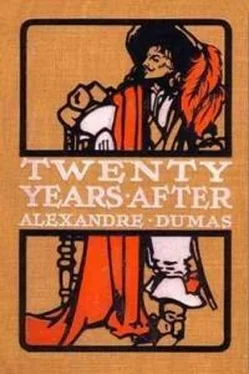
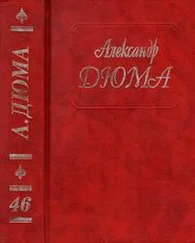
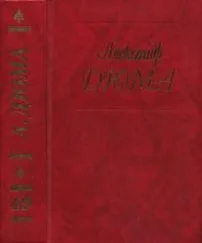


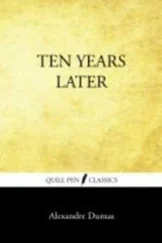
![О Генри - Через двадцать лет [After Twenty Years]](/books/415401/o-genri-cherez-dvadcat-let-after-twenty-years-thumb.webp)



